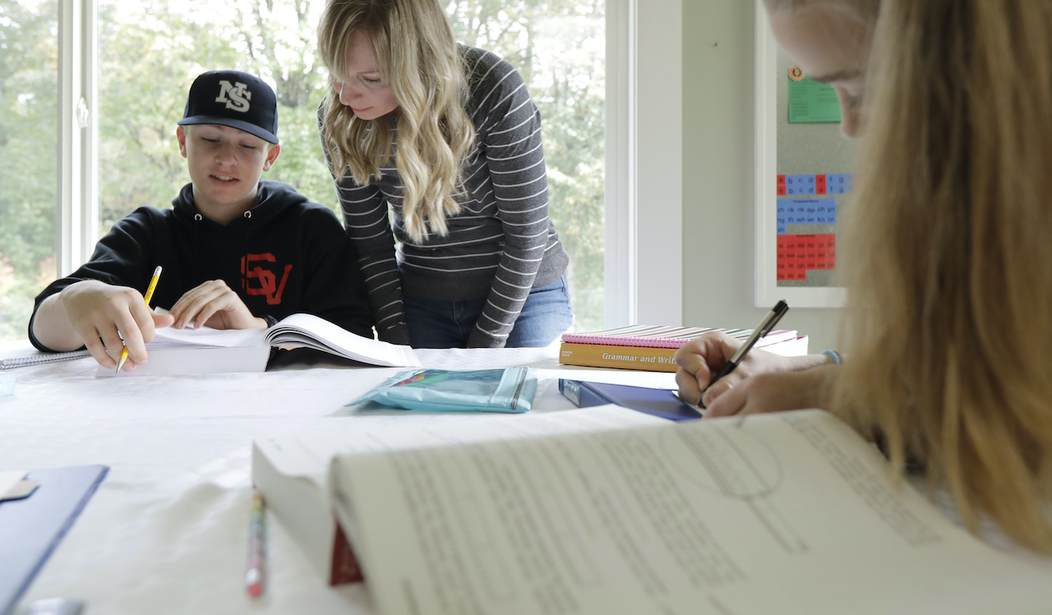“What I like doing best is Nothing,” Christopher Robin tells Winnie-the-Pooh in A. A. Milne’s 1928 collection of stories, The House at Pooh Corner. The capitalization of “Nothing” is not a typo. Milne is introducing children (and re-introducing their parents) to a deep philosophical point through the voice of a fictional boy and his anthropomorphic stuffed bear.
“How do you do Nothing?” Pooh asks. Christopher Robin responds that being outdoors on a lovely day—as they are—sitting on a grassy knoll, enjoying one another’s company, with birds singing in the trees above, is: “a nothing sort of thing.” He further explains, ‘It means just going along, listening to all the things you can’t hear…”
Americans could benefit from “doing nothing.” Fear surrounds us. Anxiety is hindering our decision-making skills.
Americans consistently report that their number one source of fear is corrupt politicians. Gallup polling shows American parents have elevated unease over their children’s safety in schools. And a majority of Americans fear cyberterrorism and China’s rising economic power.
A study from the University of Pittsburgh shows that we make inferior decisions when we are anxious because fear causes parts of our brain to literally shut down. The study’s lead author, Professor in the Department of Neuroscience Bita Moghaddam, states: “… this study shows that anxiety disengages brain cells in a highly specialized manner.”
Often, the “decision” we make while afraid is the decision not to act. And when good men do nothing, evil triumphs—to paraphrase Edmund Burke. It is crucial for parents, teachers and faith leaders to reverse this trend by actively promoting “high leisure”—a form of contemplative idleness that is next to Godliness.
The idleness described by Christopher Robin is essential to sound decision-making, productivity and innovation. So, what exactly is high leisure?
Recommended
Leisure—Key to Humility, Productivity and Innovation
Impressionist artist Claude Monet—famous for his innovative techniques for capturing natural light and for his series of haystacks and waterlilies—credited solitude in nature for his success. “My art is an act of faith, an act of love and humility. Yes, humility. …I applied paint to these canvases in the same way that monks of old illuminated their books of hours; they owe everything to the close union of solitude and silence, to a passionate and exclusive attention akin to hypnosis.”
As Americans, we often fall prey to believing that our personal worth is tied to our continuous individual output—or “productivity.” Unfortunately, this belief serves to increase our anxiety and impede our productivity. This conviction also lacks the humility of great artists like Monet who recognize that all inspiration comes from God and His creation. Ultimately, in order to have periods of great production, we must allow ourselves to experience periods of meditative leisure.
History’s greatest innovators and artists were all highly contemplative and playful. Like Monet, famous authors like Agatha Christie, J. R. R. Tolkien and G. K. Chesterton all regularly enjoyed meditative time in nature.
Successful inventors are also notorious for leisurely playfulness. For example, 3M Post-it® Notes were discovered accidentally during choir practice. 3M Scientist Arthur Fry pasted an extra weak adhesive (that had been invented four years earlier in 1970 by another 3M scientist named Dr. Spencer Silver) to his hymnal page markers. The result was hymnal page markings that didn’t keep falling out of place—yet were also removable. In four years, no one sitting in a research laboratory could conjure up a practical use for 3M’s removable adhesive. It took a 3M scientist who was leisurely singing in order to birth an incredibly useful and popular product.
Thomas Aquinas—likely the world’s most influential philosopher—was so practiced in regular silent contemplation that he could easily fall into a pensive trance. King Louis IX of France once invited Aquinas to a festive dinner in Paris. Seated at the dining table, Aquinas quickly became so immersed in thought that suddenly—forgetting he was at a social event—he felled his large fist on the table with a resounding thud and loudly proclaimed: “And that will settle the Manichees!” (King Louis IX discreetly asked his secretaries to bring tablets to Aquinas and record his newfound argument against Manicheism lest he forget it while preoccupied in rumination.)
Circling back to Monet: Monet inspired countless artists who came after him. He also abhorred modernist “art” by painters who “turn their backs on reality” and go “against nature”—calling this type of painting “filled with an inexpressible sadness.” Everyone—regardless of profession—can learn from Monet’s realization that stillness and appreciation for nature are two reliable sources of inspiration and refreshment.
“Doing Nothing”—Not Escapism
It’s counterintuitive. When we view leisure as a means of “escape” from stress, we end up increasing our anxiety rather than retreating.
Etymologically, “leisure” comes from the Latin word for school: scola. For most of human history, leisure has been regarded as a form of education in which we contemplate our world and remember our past.
Modern culture has conflated “escapism”—or mindless amusement—with leisure. “So deeply ingrained in our current culture is the obsession with entertainment that we have begun to think that it is natural to human life,” University of St. Thomas Professor Michael J. Naughton writes in his book, Getting Work Right. He explains: “Just as too much sleep makes us tired, sluggish and apathetic, so also too much entertainment makes us anxious.”
Naughton warns that “default” recreational pastimes for Americans—like watching TV and scrolling on smartphones—are the antithesis of true leisure activities that allow our minds to unwind into relaxing, meditative thought. Examples of authentic leisure activities are: prayer, silence, and walking in nature.
Sunday is a common day of the week on which Americans swap the authentic leisure prescribed in the Fourth Commandment of Moses with faux-leisure. Naughton teaches his students that “Our need is not for just any kind of leisure, but for the kind of celebration that radically affirms the goodness of the world and that marvels at what God has created.”
Joy is a fruit of true leisure. Thus, a test to know whether we are authentically relaxing is to ask ourselves: Does this activity leave me with a sense of gratitude? Do I feel a sense of wonder rather than a sense of overwhelm?
Sadly, once an escapist activity ends—our old worries come crashing back like a tidal way. Not necessarily instantly. It may take days for us to realize that we remain restless. Stress compounds until it bursts in the form of a minor inconvenience—like slow internet speed—to which we respond with inordinate frustration. Thus, we don’t draw the connection between habitual escaping and habitual anxiety.
Many Americans feel physically ill on Sunday evenings, anticipating the pending work-week. Peace is possible when our mind habitually experiences silence—a respite from artificial stimuli—and regularly enters a state of contemplation.
Authentic leisure won’t instantly or completely eradicate chronic stress. However, over time, by engaging in “nothing sorts of things” we will refresh ourselves physically and emotionally. Our families and our culture will benefit immensely.

























Join the conversation as a VIP Member